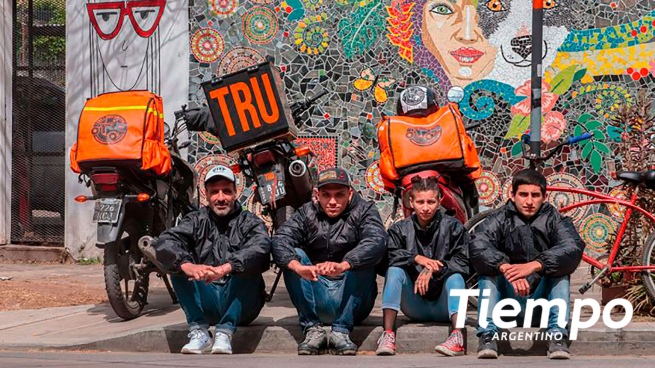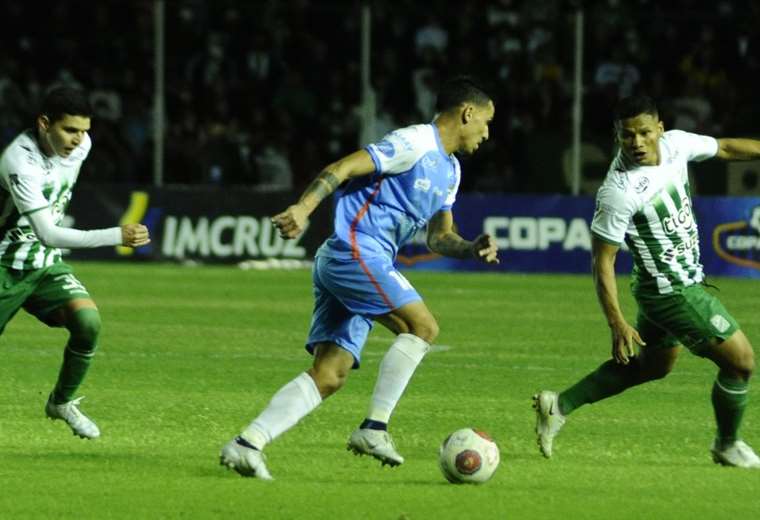Villa Ballester is almost unrecognizable. High-rise buildings replaced the old mansions of European migrant families and porteños who, at the end of the 19th century and the beginning of the 20th, had fled from the noise of the Capital. However, it still preserves relics such as the cobblestones on Lacroze street, declared a Cultural Historical Heritage of the San Martín district, which remains as it used to be. In the surroundings of that cobblestone, a gastronomic pole was set up through which dozens of workers travel daily on bicycles and motorcycles who formed a cooperative in a pandemic to carry out the unprecedented initiative to face food delivery applications and propose another model which has the support of businesses and neighbors.
Delivery Workers United (TRU). The members proudly wear their backpacks, hats and jackets with the initials of the cooperative they built just over two years ago. Pablo Gómez is 51 years old and although he had different jobs, the delivery job has always been with him. “I started when he was little, in the ’90s he was already a biker. He went to the pizzeria, he made video stores distributing the films. There was a delivery boom at the time. Obviously free… The job was so precarious that with the tip, the plate of food and a few mangoes he supported himself. Without social work, without a bonus”, describes the president of the cooperative, who admits that “from the ’90s to today, precariousness has deepened”.
“Now it is believed that the delivery man is under all current labor regulations. It is well seen that he is monotributista or that he works for an application. I worked for one and for two years I have been wanting them to receive a Document Letter because I don’t even know where they are,” insists Pablo, who until the first months of the pandemic walked from one end of San Martín to the other with Orders Now .
At that time, this man hardened by speed and the adversities of the weather in the daily life of the city streets, warned that while workers from other regions such as CABA, the north, west, south or Gran La Plata, were encouraged for the application with a bonus for rain or for working on special dates such as Father’s or Mother’s Day, “for the northwest, which is us, they never gave us anything. They discriminated against us. We didn’t have that right.” And he began to talk about these problems with other colleagues.
Thus they began to discuss whether they should unionize, set up a company or another type of enterprise. During those days of quarantine, the distributors from different points of the AMBA met at the Obelisk and after attending some meetings they decided that the best thing was to make their own path. Without even considering forming a cooperative, Pablo started alone, on his own, outside of the applications. When he agreed with four or five locals, he added his son, who helped him by bicycle. When the businesses were already six or seven, another colleague joined. There was a possible scenario to be able to grow.
A year ago they were formed as a cooperative and today there are 17 colleagues who take turns working seven days a week, from 8 a.m. to 12 p.m., and have 50 affiliated locations from Villa Ballester. At present, they cannot add more business due to a lack of distributors since “the objective has always been to maintain the best quality of service”: that the order arrives in the best conditions, directly from the gastronomic premises to the person’s home.
Pablo got tired of asking for a hand in official organizations and political parties. “Only social organizations like the Evita Movement supported us. Today we are part of the Union of Workers of the Popular Economy (UTEP)”, highlights the president of TRU. Beyond the fact that the essence is the street, along with six other cooperatives, they share a space in the building of La Disco de Oro, an emblematic empanada factory in San Andrés that was recovered by its workers.
“Regarding the number of orders, we are a little below Orders Now, which have large clients such as McDonald’s and Burger King, but above Rappi’s volume. We have a WhatsApp group for each client, who knows the delivery men. There is a more human, personal relationship,” she adds.
Nicolás Ayala, 20, came to TRU through a Facebook post when he was 18. “At that time I had a bicycle and we stopped with Pablo and the boys at the Ballester roundabout. We didn’t have a place. The area was very wide and after three months I was able to buy the motorcycle”, he says. Alejo Gómez, also 20, was a delivery boy for Ordenes Ya and entered TRU at the invitation of Pablo’s son, with whom he is a friend: “he brought me the idea and I tried it. I liked it because I saw that he took out orders, he did not sit still at home waiting 25 thousand hours ».
“I stayed because I saw that it was something else. In the App my motorcycle would break and they would tell me ‘fix it and come back when you can’. Here I send a message in the group and at the touch you have a colleague who helps you if you need to patch the wheel, a tool or money –he continues–. There is another fellowship. That is the good thing about the cooperative, because they are always there no matter what. In Orders Now, if something happened to you, they tell you ‘you’re a monotributist, you’re your owner, handle yourself’”.
Karen Peralta, 21, came to TRU at the recommendation of Alejo. “I was working at Rappi, where I had a lot of problems. They stole my bike and I was unemployed for about a month without being able to work”, she graphs.
“One day Alejo fell and told me that they were taking delivery men. He didn’t even have a bike and he told me it was the same. I went just like that, there I met Pablo and another colleague who interviewed me. They told me ‘if you want to start now, there’s a bike out there’. They lent me the backpack and I started. It’s much better than the app,” Karen concludes.
For Pablo, the formula is simple: “the delivery man who comes to work in the cooperative has to get along with the merchant and his colleagues, treat the neighbor well and be responsible, because if he fails, he fails the colleague.” >>
“If something happens in an app that you don’t like, we have nowhere to complain”
Diego Faggioli is the president of the Buenos Aires Gastronomic Federation and one of the referents of the prominent gastronomic center of Villa Ballester. From his business (Berlina) he explains to Tiempo the advantages of being able to count on the TRU cooperative: “working with them means that the order will arrive in good condition. We have a permanent back and forth. If there is a delay, if a motorcycle is broken, another delivery man comes out to look for it. We know all this instantly and so does the client”.
“The order is delivered by someone you trust,” he adds. Food is being handled and it is a very big responsibility. They are always the same. A whole circle is generated. I think that’s the most important thing”. Faggioli points out that the rest of the businesses in the neighborhood welcome the initiative and are waiting for more delivery men to join the system.
“If something happens in an app that you don’t like, neither the client nor I as the owner have anything to complain about. Sometimes the order never arrives or arrives incomplete or directly in poor condition, and you can’t apologize to the customer for something that wasn’t your fault, because you don’t have access. That with TRU is impossible to happen, ”he continues. For the gastronomic reference, the organization of these workers results in future benefits: “tomorrow they will be able to request loans to change the motorcycle or bicycle and continue improving their working conditions.”
In a pandemic, delivery orders grew exponentially, but with them job insecurity and helplessness in the face of the anonymity of apps. Faggioli is confident, like TRU, that these production units will soon be replicated in other parts of the suburbs and the country.
“Just by joining parts and without producing, apps take between 20% and 30% of each order”
Not only workers claim the apps, businesses also began to raise their voices. “On Friday nights, for example, we began to realize that Requests Already turned us off. They said that both my bar and others were closed. Of course, they concentrated all their distributors in McDonald’s and Burger King, because they have agreements with them. They addressed the orders without notifying you”, claims Diego Faggioli, from Berlina. Just by joining parts and without producing, the apps “take between 20% and 30% of each order. It’s a lot. More than my profitability, not to mention when they impose discounts on you to promote their brand. My wife, who is an accountant, to keep track of the payments of the applications she had to make a special program, because they do it after 15 days, working with your money and with the amount they want, ”adds the businessman.
COOPCYCLE
TRU members are evaluating using the Coopcycle app, which is open source. It emerged in Europe after massive mobilizations of delivery people who complained about the unequal working conditions that traditional applications imposed on them. Coopcycle was created by the federation of bicycle delivery cooperatives. Several developers were key for delivery workers and food businesses to meet. “She is French and already works in Europe. She arrived in Mexico this year and the idea is to download Coopcycle to all of Latin America. The app is released, with certain requirements”, explains Pablo.












